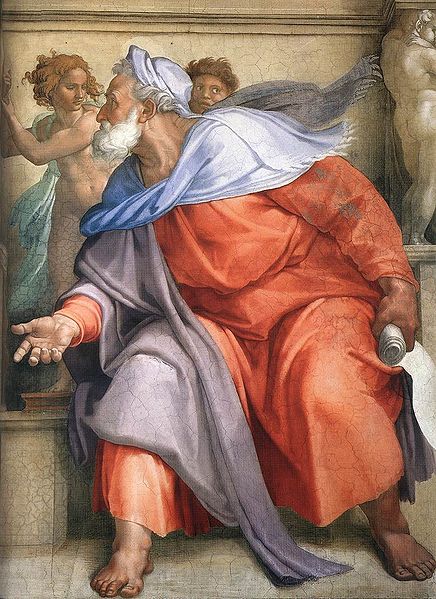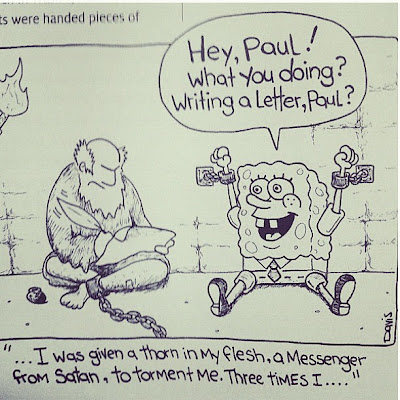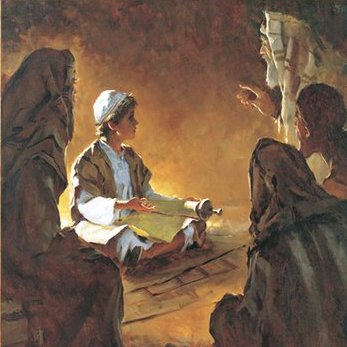Sunday Lectionary: A Prophet Among Us
Fourteenth Sunday in Ordinary Time: July 8, 2012
In this week’s Readings we hear about prophethood and about our utter dependence upon the grace of God.
In our First Reading we read about the calling of the Prophet Ezekiel, how he was strengthened by the Spirit and sent to proclaim an unpopular message to an obstinate people. In the Gospel, Jesus returns to His hometown of Nazareth and is met with suspicion and unbelief.
We are convinced beyond doubt that the truths of faith cannot deceive us; yet we cannot seem to bring ourselves to trust in them. It is easier for us to trust in human reasons and the deceiving appearances of the world. This, precisely, is the reason for our poor progress in virtue and in all that pertains to God’s glory – St. Vincent de Paul
For me though, the Readings which stand out are the Psalm and the Second Reading from St. Paul. The psalm expresses complete reliance upon God. St. Paul’s epistle to the Corinthians expresses a similar theme. Paul, probably the greatest Christian missionary in the history of the Church, knew something about strength and weakness. He knew that, in his weakness, God’s strength was more greatly manifested.
As we prepare ourselves to receive the Eucharist this week, let us come mindful of our weaknesses and therefore also recognize our need of God, thankful that He calls poor, imperfect creatures to be His children and to declare His goodness.

Reading I: Ezekiel 2:2-5
 Our First Reading comes from a prophet we’ve heard quite a bit from recently, the Prophet Ezekiel, a prophet during the Babylonian exile. In the following extract we hear about Ezekiel’s initial call by God to be a prophet.
Our First Reading comes from a prophet we’ve heard quite a bit from recently, the Prophet Ezekiel, a prophet during the Babylonian exile. In the following extract we hear about Ezekiel’s initial call by God to be a prophet.
As the LORD spoke to me, the spirit entered into me and set me on my feet, and I heard the one who was speaking say to me:
Son of man, I am sending you to the Israelites, rebels who have rebelled against me; they and their ancestors have revolted against me to this very day. Hard of face and obstinate of heart are they to whom I am sending you. But you shall say to them: Thus says the Lord GOD! And whether they heed or resist–for they are a rebellious house – they shall know that a prophet has been among them.
Questions:
- What do you know about the Prophet Ezekiel?
- What does God send when He calls Ezekiel to be a prophet?
- What name does God use for Ezekiel?
- How does God describe the Israelites? Why?
- Who has rebelled against God?
- What message does God give to Ezekiel?
- How does God say they will respond?
Commentary:
As the LORD spoke to me, the spirit entered into me and set me on my feet, and I heard the one who was speaking say to me: …
In the verses preceding this passage, Ezekiel sees the glory of the Lord and falls face down. The Spirit enters him and draws him to his feet, strengthening him for his vocation.
In our psalm (and Second Reading) we will recognize our utter dependence upon God. In order for Ezekiel to fulfill his mission, he will need divine aid.
…Son of man, …
The phrase “Son of man” is used 93 times in Ezekiel. It doesn’t have a Messianic connotation here as it does in the Book of the Prophet Daniel. Here in Ezekiel, it is a term which contrasts the humble nature of Ezekiel to the transcendent and everlasting God.
…I am sending you to the Israelites, …
God is sending Ezekiel to the descendants of Jacob, those in captivity with him in Babylon.
…rebels who have rebelled against me; they and their ancestors have revolted against me to this very day.
God describes His people as “rebels” since they have rebelled against God, His covenant and His commandments. This is not a recent development. God says that “their ancestors” rebelled, as do the people “to this very day”. A feature of Ezekiel’s preaching concerns how Israel has consistently rejected God throughout there history.
Hard of face and obstinate of heart are they to whom I am sending you.
The people are stubborn, but God is sending Ezekiel anyway.
But you shall say to them: Thus says the Lord GOD! And whether they heed or resist–for they are a rebellious house – they shall know that a prophet has been among them.
This is the message Ezekiel is to proclaim. Whether the people listen to him, this is what Ezekiel must do. It is noteworthy that many who met Jesus resisted His message too.
Responsorial Psalm: Psalm 123:1-2, 2, 3-4
Psalm 123 is a humble prayer to God for mercy and a declaration of complete dependence upon God. This theme will come up again in our Second Reading from St. Paul.
R. (2cd) Our eyes are fixed on the Lord, pleading for his mercy.
To you I lift up my eyes who are enthroned in heaven – As the eyes of servants are on the hands of their masters.
As the eyes of a maid are on the hands of her mistress, So are our eyes on the LORD, our God, till he have pity on us.
Have pity on us, O LORD, have pity on us, for we are more than sated with contempt; our souls are more than sated with the mockery of the arrogant, with the contempt of the proud.

Questions:
- What is the theme of this psalm?
- To what does the psalmist compare himself?
- What does “sated” mean?
Commentary:
R. (2cd) Our eyes are fixed on the Lord, pleading for his mercy.
The Lord’s people are attentive to Him and acknowledge that they are utterly dependent upon Him.
To you I lift up my eyes who are enthroned in heaven – As the eyes of servants are on the hands of their masters.
This psalm uses the simile of faithful servants who attend to their master.
As the eyes of a maid are on the hands of her mistress, So are our eyes on the LORD, our God, till he have pity on us.
This is a repetition of the servant simile.
Have pity on us, O LORD, have pity on us, for we are more than sated with contempt; our souls are more than sated with the mockery of the arrogant, with the contempt of the proud.
The word “sated” means to have had enough, a full measure. The psalmist is saying that they have been enduring all the contempt and mockery of the “arrogant” and “proud”, those who trust in themselves rather than in God.
Reading II: 2 Corinthians 12:7-10
Our Second Reading today is probably my favourite passage in all of the Pauline corpus.
One of the reasons Paul wrote this letter to the Church at Corinth was to respond to his critics. His critics were the Judaizers who asserted that in order to be a Christian, one must keep all the Law of Moses. In the verses leading up to today’s passage, Paul has been recounting breathtaking supernatural ecstasies, experiences which he immediately contrasts…
Brothers and sisters: That I, Paul, might not become too elated, because of the abundance of the revelations, a thorn in the flesh was given to me, an angel of Satan, to beat me, to keep me from being too elated. Three times I begged the Lord about this, that it might leave me, but he said to me, “My grace is sufficient for you, for power is made perfect in weakness.” I will rather boast most gladly of my weaknesses, in order that the power of Christ may dwell with me. Therefore, I am content with weaknesses, insults, hardships, persecutions, and constraints, for the sake of Christ; for when I am weak, then I am strong.

Questions:
- What “revelations” does Paul refer to here?
- What is the “thorn in the flesh” he mentions?
- What was Paul’s initial response to this “thorn”?
- What was the Lord’s response?
- What was Paul’s adjusted response? What can we learn from this? How can we apply it to our lives?
Commentary:
Brothers and sisters: That I, Paul, might not become too elated, because of the abundance of the revelations, …
In the earlier verses, Paul spoke about being “caught up to the third heaven…paradise”.
…a thorn in the flesh was given to me, …
There has been much speculation by theologians as to what this “thorn” may have been (there is also a very long thread on this subject at the Catholic Answers Forum). Some kind of psychological issue? Some kind of spiritual issue? Was some kind of sickness? Some physical disability? We know that Paul had troublesome eyesight. Could it have been that?
As you know, it was because of an illness that I first preached the gospel to you. Even though my illness was a trial to you, you did not treat me with contempt or scorn. Instead, you welcomed me as if I were an angel of God, as if it were Christ Jesus himself. What has happened to all your joy? I can testify that, if you could have done so, you would have torn out your eyes and given them to me… See what large letters I use as I write to you with my own hand! – Galatians 4:13-15; 6:11
Could it have been some personal opposition (possibly by Judaizers)? Here is an example of the thorn metaphor being used in such a way:
But if you do not drive out the inhabitants of the land, those you allow to remain will become barbs in your eyes and thorns in your sides – Numbers 33:55
Here’s a quick breakdown of what various Christians have thought:
Physical illness: Anselm, Bede, Sedulius, Jerome, Thomas
Persecutions from adversaries: Chrysostom, Theophylact, Theodoret, Oecumenius, Ambrose, Erasmus
Regardless, whatever the “thorn” was, it was causing Paul problem.
I’m actually rather pleased that we don’t know for certain the nature of the “thorn” since it means that every future Christian can read this text and apply it to his or her own “thorn”.
…an angel of Satan, to beat me, …
This sounds very much like the opening chapters to Job:
The Lord said to Satan, “very well, then, he is in your hands; …so Satan went out from the presence of the Lord and afflicted Job…” – Job 2:6-7
We will hear from Paul that this thorn turns out to be something of a blessing. Here is St. Augustine commenting upon this phenomenon of God using the devil:
Some ask if the devil is good because he is useful. We respond that he is only evil, but God who is good and almighty draws from the devil’s malice many just and good things. The devil possesses a will that is bent on evil, not the Providence of God that brings good from him – St. Augustine, Against the Manichaeans 2, 28, 42
…to keep me from being too elated.
To ensure that Paul would not become full of pride because of his supernatural experiences the “thorn in the flesh” was given to him to humble him.
Three times I begged the Lord about this, that it might leave me, …
Paul prays for the “thorn” to be taken away. The number three is the number symbolic of completion – this should have done the trick…
…but he said to me, “My grace is sufficient for you, for power is made perfect in weakness.”
…but Paul’s prayer was denied.
[Job’s] wife said to him, “Are you still holding on to your integrity? Curse God and die!” He replied, “You are talking like a foolish woman. Shall we accept good from God, and not trouble?” – Job 3:9-10
Rather than taking the “thorn” away, God gives Paul a message, much like the Prophet Ezekiel. Rather than healing, grace is given, demonstrating that God gives us what we need rather than what we tell Him we want. God says that he will use this thorn for His good purpose:
And For And we know that in all things God works for the good of those who love him, who have been called according to his purpose – Romans 8:28
Since the thorn is not removed, Paul is utterly dependent upon grace and strength given by God:
I can do everything through him who gives me strength – Philippians 4:13
This theme of dependence is found in this week’s psalm.

I will rather boast most gladly of my weaknesses, in order that the power of Christ may dwell with me. Therefore, I am content with weaknesses, insults, hardships, persecutions, and constraints, for the sake of Christ; for when I am weak, then I am strong.
Paul has learnt to treasure his weakness since it provides greater room for God to work. As John the Baptist said, “He must increase, I must decrease”, and as the Venerable Servant of God said:
Santo Subito!
Gospel: Mark 6:1-6
Have you ever returned to your home town after a long time away? Was it….well, weird? Well, that’s nothing! Jesus, after gaining notoriety as a teacher and healer, returns to His home town of Nazareth. Here is the greeting He received…
 Jesus departed from there and came to his native place, accompanied by his disciples.
Jesus departed from there and came to his native place, accompanied by his disciples.
When the sabbath came he began to teach in the synagogue, and many who heard him were astonished. They said, “Where did this man get all this? What kind of wisdom has been given him? What mighty deeds are wrought by his hands! Is he not the carpenter, the son of Mary, and the brother of James and Joses and Judas and Simon? And are not his sisters here with us?” And they took offense at him.
Jesus said to them, “A prophet is not without honor except in his native place and among his own kin and in his own house.” So he was not able to perform any mighty deed there, apart from curing a few sick people by laying his hands on them. He was amazed at their lack of faith.
Questions:
- What happened in last week’s Gospel? How does this contrast with the Gospel this week?
- What was Jesus’ “native place”? Where had He been?
- What happens when He comes home?
- Why do you think people acted this way?
- How might envy and familiarity cause a lack of faith?
- Why do you think Jesus had setup His ministry in Capernaum?
- How do your friends and family respond to your faith in Christ?
Commentary:
Jesus departed from there and came to his native place, accompanied by his disciples.
Jesus had previously made Capernaum His base of operations:
A few days later, when Jesus again entered Capernaum, … – Mark 2:1
…but now Jesus returns with His disciples to Nazareth:
He means by His country, Nazareth, in which He was brought up. But how great the blindness of the Nazarenes! they despise Him, Who by His words and deeds they might know to be the Christ, soley on account of His kindred… St. Bede
When Joseph and Mary had done everything required by the Law of the Lord, they returned to Galilee to their town of Nazareth – Luke 2:39
Jesus then goes to the synagogue…
When the sabbath came he began to teach in the synagogue, …
As people gathered in the Synagogue on the day of rest, Jesus teaches. Visiting teachers would often be invited to teach at the synagogue.
…and many who heard him were astonished. They said, “Where did this man get all this? What kind of wisdom has been given him? What mighty deeds are wrought by his hands!
Jesus is met with amazement. They had heard about what He had been doing elsewhere and they cannot understand it! How could this person they knew so well, teach and act in this way?
The reaction here is similar to previous events in Jesus’ life:
1. Teaching in Capernaum
They went to Capernaum, and when the Sabbath came, Jesus went into the synagogue and began to teach. The people were amazed at his teaching, because he taught them as one who had authority, not as the teachers of the law. Just then a man in their synagogue who was possessed by an impure spirit… The people were all so amazed that they asked each other, “What is this? A new teaching—and with authority! He even gives orders to impure spirits and they obey him.” News about him spread quickly over the whole region of Galilee. – Mark 1:21-28
2. Reminiscent of the finding of the child Christ in the Temple
Every year Jesus’ parents went to Jerusalem for the Festival of the Passover. When he was twelve years old, they went up to the festival, according to the custom. After the festival was over, while his parents were returning home, the boy Jesus stayed behind in Jerusalem, but they were unaware of it… they went back to Jerusalem to look for him. After three days they found him in the temple courts, sitting among the teachers, listening to them and asking them questions. Everyone who heard him was amazed at his understanding and his answers. – Luke 2:41-47
Is he not the carpenter, …
The implication here is that Jesus is just a regular blue-collar worker and not a scholar:
“Jesus came as the son of a carpenter. He was not physically attractive, just as the prophets had predicted of Him (Isaiah 53:2). He was merely a carpenter, making plows and yokes, and instructing us by such symbols of righteousness to avoid an inactive life.” – Saint Justin the Martyr (ca. A.D. 155), Dialogue With Trypho The Jew, 7,7
It appears Jesus followed in His foster father’s footsteps.
…the son of Mary, …
Since the Jews usually spoke about lineage in terms of the father, this is quite possibly a slur against Jesus, suggesting that He was illegitimate.
…and the brother of James and Joses and Judas and Simon? And are not his sisters here with us?”
Hebrew and Aramaic have no word for cousin or nephew. The word “brother” is a broad term which includes uncles, cousins, nephews and other male relatives.
For example, Lot is literally called the “brother” of Abraham ( Genesis 13:8; 14:14, 16) but we later find out that Lot’s father was the brother of Abraham (Genesis 11:26-27). Therefore, although Scripture describes Lot and Abraham as brothers, Lot was actually Abraham’s nephew:
They bear witness that His brothers and sisters were with Him, who nevertheless are not to be taken for the sons of Joseph or of Mary, as heretics say, but rather, as is usual in Scripture, we must understand them to be His relations, as Abraham and Lot are called brothers, though Lot was brother’s son to Abraham. – St. Bede
We can identify the people mentioned here:
1. “James and Joses”
These were the sons of Mary of Clophas:
Near the cross of Jesus stood his mother, his mother’s sister, Mary the wife of Clopas, and Mary Magdalene. – John 19:25
2. “Judas”
This was most likely the son of James:
Judas son of James, and Judas Iscariot, who became a traitor – Luke 6:12
2. “Simon”
This is possibly the following Simon:
Simon the Zealot and Judas Iscariot, who betrayed him. – Matthew 10:4
If Jesus had other brothers, entrusting the Blessed Virgin to St. John’s care would have been a tremendous insult to them!
Near the cross of Jesus stood his mother, his mother’s sister, Mary the wife of Clopas, and Mary Magdalene. When Jesus saw his mother there, and the disciple whom he loved standing nearby, he said to her, “Woman, here is your son,” and to the disciple, “Here is your mother.” From that time on, this disciple took her into his home. – John 19:25-27
You can read a more thorough defense of Mary’s perpetual virginity here and here.
And they took offense at him. Jesus said to them, “A prophet is not without honor except in his native place and among his own kin and in his own house.”
Their amazement turns into incredulity.
After the miracles which have been related, the Lord returns into His own country, not that He was ignorant that they would despise Him, but that they might have no reason to say, “If you had come, we had believed You” – Theophyl
What happens here is not new. Jesus says that it has ever been thus. He compares Himself to the Old Testament prophets who were persecuted by their own people. It happened to Christ and it will happen to us too:
“Blessed are you when people insult you, persecute you and falsely say all kinds of evil against you because of me. Rejoice and be glad, because great is your reward in heaven, for in the same way they persecuted the prophets who were before you.” – Matthew 5:11-12
Even Moses bears witness… also Elias, Jeremiah, and the remaining lesser prophets, were worse received in their own country than in strange cities, for it is almost natural for men to envy their fellow-townsmen; for they do not consider the present works of the man, but they remember the weakness of His infancy. – St. Bede
So he was not able to perform any mighty deed there, apart from curing a few sick people by laying his hands on them. He was amazed at their lack of faith.
It wasn’t so much that He couldn’t but that He didn’t heal many:
What, however, is here expressed by “He could not”, we must take to mean, “He did not choose“, because it was not that He was weak, but that they were faithless; He does not therefore work any miracles there, for He spared them, lest they should be worthy of greater blame, if they believed not, even with miracles before their eyes. Or else, for the working of miracles, not only the power of the Worker is necessary, but the faith of the recipient, which was wanting in this case: therefore Jesus did not choose to work any signs there – Theophyl
Last week’s Gospel was all about faith (the woman with the hemorrhage and Jairus the synagogue official). The Gospel this week is about lack of faith.
“Two things must coincide for the reception of healing: the faith of those who need healing, and the power of him who will heal. If either of these are wanting, the blessing of a cure will not readily be attained.” – Pseudo-Victor of Antioch (5th century), Commentary on Mark 6

